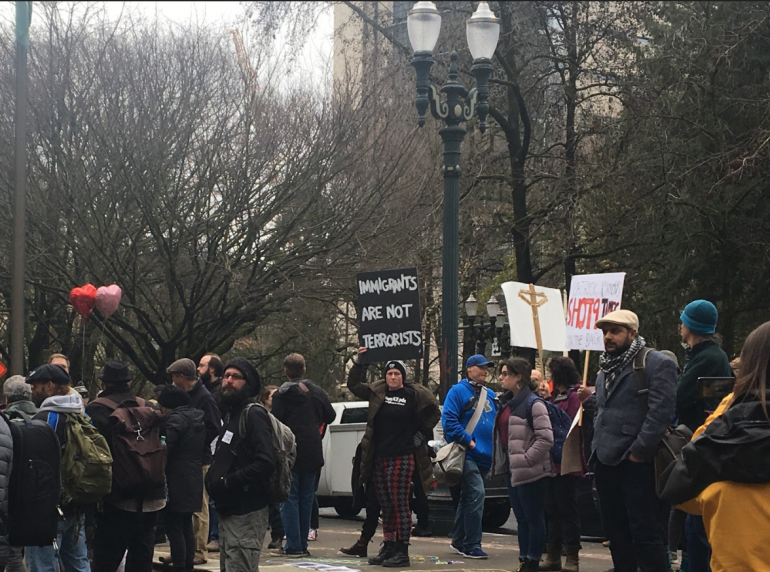In March 2017, nearly two months after the Trump administration took control of the federal government, the city of Portland passed resolution 37277 to “Declare the City of Portland a Welcoming City, a Sanctuary City, and an Inclusive City for all.” The legislation, as its title would suggest, reaffirmed the city’s dedication to protecting the immigrant and refugee population in our community.
However, strong sanctuary statutes are hardly anything new in the state of Oregon. The legislation best known for being Oregon’s poster Sanctuary Law dates back to the summer of 1987, and prohibits the use of any state or local resources to enforce federal immigration law. Essentially, if one’s only crime is being in the country illegally, they technically would receive no hassle from Portland or Oregon law enforcement police and sheriffs.
As far as state laws go, resolution 37277 has been a relatively non-controversial one for most of its life. In the midterm elections last November the initiative Measure 105, to repeal the sanctuary law, lost 37 percent to 63 percent of the vote; Oregonians reaffirmed that they are still committed to sanctuary policies within their state.
The law has become especially relevant today, as the Trump administration continues to take a hard stance with unrelenting legislation targeting both illegal and legal immigration. As the federal government pushes a far harsher stance than has been seen before, it leaves state and local governments in a unique position. What role do they play in the protections and rights for immigrants?
The City of Portland took two distinct legislative steps in the first two months of 2019 towards defining their own role: Passing resolutions to leave the Joint Terrorism Task Force [JTTF] and to apply to join the Safety and Fairness for Everyone [SAFE] Network.
Portland City Council voted unanimously to apply to join the SAFE Network on Jan. 23, in order to help provide universal legal representation to all undocumented immigrants in the city. The SAFE Network, created by the Vera Institute of Justice, a nonprofit group, is a collective of cities committed to supporting undocumented immigrants across the country. Legal resources and representation in deportation cases for those who would otherwise not have access to it increase immigrants’ chances of winning their cases. Transactional Records Access Clearinghouse reported that in 2016 unrepresented asylum seekers had a 90 percent of having their claims denied; however, asylum seekers with legal representation were denied in 48 percent of cases. According to the SAFE Network’s website, “immigrants who are represented are up to ten times more likely to establish a right to remain in the United States than those who are unrepresented.”
Joining the network would give the city of Portland access to training and support for legal services defending undocumented immigrants, as well as monitoring performance and outcomes of the program. It does not cost money to join, but the city would also be eligible for up to $100,000 in grants towards the cause. The vote was 4-0 in favor of passing the resolution—Mayor Ted Wheeler was absent from the hearing and the vote.
The importance of universal representation in court cases was heavily stressed throughout the meeting. The Sixth amendment of the Constitution guarantees the right to a lawyer not solely to citizens of the United States; however, it only applies to criminal cases, whereas deportation cases are considered to be civil cases. Therefore, undocumented immigrants are not guaranteed a lawyer when they are facing deportation, under the current law. Commissioner Chloe Eudaly introduced the bill in hopes to assist immigrants with the life-changing ability to have that legal representation.
“Our federal government is criminalizing immigrants and refugees; they’re violating their constitutional rights,” Eudaly said. “As criminals, they would have a right to representation, and they certainly have a right to due process regardless. However, we don’t supply them with that. So this effort around universal representation seeks to remedy that.”
Despite the January 23, 2019 decision by the Portland City Council to apply to join the SAFE Network, the City of Portland still remained in the JTTF. The JTTF was criticized harshly by testimony in city council for unlawful surveillance of peaceful political groups, prejudice against minority groups, as well as being led by the FBI and ICE. Most concerning legally, however, was the Portland Police Bureau involvement in the task force; If PPB is supposed to be prohibited from enforcing federal immigration law, they might not be able to abide by sanctuary state and city policies if they are sharing information and resources with Immigration and Customs Enforcement. Even if PPB doesn’t actively assist ICE, the optics of their relationship with the JTTF make trusting PPB’s commitment to sanctuary policies difficult.
At Portland City Council’s Feb. 13 session, the resolution to leave the JTTF was passed. Just before the vote, a rally was held outside of city hall, with a small crowd passionately in support of passing the resolution. The rally included multiple speakers, including Commissioner Hardesty, who introduced the bill.
“Today, we have an opportunity to once again make sure that Portlanders are heard loud and clear. We want to live in a city where we are one Portland, where all of us are safe from over policing.” Hardesty insisted, “We want to make sure that everyone in our community, regardless of where they were born, what language they speak, what color they are, that they can feel that they can walk down the street safely without concern for how law enforcement will interact with them.”
The vote was 3-2 in favor of leaving the JTTF. Commissioners Hardesty, Fritz and Eudaly voted in favor, while Mayor Wheeler and Commissioner Fisk voted against. 38 Portlanders signed up to give public testimony at the session, overwhelmingly in support of the resolution; of the testimonies given, only two were against the resolution.
During her vote, Eudaly—whose vote was the only one not almost entirely certain before going into the session—asked the audience of the chamber, “Do you feel safer today than you did five years ago?” After a resounding “No,” she responded, “I don’t either.”
“Using immigration violations to bypass the criminal court system is a violation of the spirit of our due process protections,” Eudaly said. “Additionally, I continue to be wary of supporting any agency that works with ICE…I’m not convinced that there are adequate protections to ensure Portland Police Bureau officers will be walled off from this component of the JTTF’s activities.”
For both pieces of legislation, the Trump administration was directly cited as a reason behind their writing. Since entering office in 2017, President Trump has made an undoubtedly hardline stance on immigration a major factor in his policymaking. Within his first month of office alone, the president signed various executive orders to penalize sanctuary cities in attempts to withhold federal funding, ban citizens of seven Muslim-majority countries from entering the U.S, and authorize the building of a wall along the U.S.-Mexico border.
Two years later, arguments between Congress and the President over funding for the border wall caused the longest government shutdown in history, having lasted 31 days, with the president refusing to sign the budget if the funding was not included.
Both of these resolutions by Portland City Council require further work. Whether the city’s application to the SAFE Network is accepted remains to be seen. Severing ties with the Joint Terrorism Task Force could prove a long, messy, and complicated process. Both of these resolutions have impacts that are not easily known; however, they both show a desire to take steps toward making Portland a place where immigrants and marginalized people feel better supported, less targeted, and more willing to see law enforcement as a beneficial resource.





